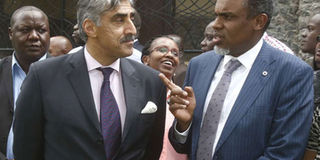Haji defends Khawar Qureshi choice, says 'war' expected

Queen's Counsel Khawar Qureshi chats with Director of Public Prosecutions Noordin Haji during a plea bargaining workshop at Enashipai Hotel in Naivasha, Nakuru County, on December 7, 2018. PHOTO | AYUB MUIYURO | NATION MEDIA GROUP
What you need to know:
- Haji cited a case at a Kapenguria court in 1952 that involved Mzee Jomo Kenyatta.
- Public Prosecutions Secretary Dorcas Odour said most of the counsels in the country were reluctant to take the case either on behalf of the DPP or of the accused person.
Queen's Counsel Khawar Qureshi's appointment to Deputy Chief Justice Philomena Mwilu's case is not a new phenomenon, Director of Public Prosecutions Noordin Haji said on Friday.
Mr Haji defended Prof. Qureshi's appointment in Naivasha, citing a case at a Kapenguria court in 1952 that involved Mzee Jomo Kenyatta.
SABOTAGE
The DP announced the appointment of Mr Qureshi last week, saying he picked the London-based professor through single-sourcing after failing to find a suitable candidate through advertisement.
“It’s nothing new…” he said on Friday, and noted deliberate efforts in some quarters to derail the prosecution of graft suspects.
“Are we being told that we cannot bring in such people because it is a corruption-related case? The issue of the Queen’s Counsel (QC) is not new in this country,” he said.
The case that involved Mzee Kenyatta is commonly referred to as that of the Kapenguria Six. The other five were Achieng' Oneko, Fred Kubai, Kung'u Karumba, Bildad Kaggia and Paul Ngei.
The six were arrested on October 20, 1952 in the wake of Mau Mau uprising. They were charged with trying to overthrow the colonial government through the Mau Mau movement. They were jailed in Northern Kenya after the trial that lasted a year.
Regarding the NYS 2 scandal, Mr Haji said eight banks have been penalised due to prosecution.
“It vindicates prosecutors. It is the first time banks are paying such penalties,” he said.
KENYANS RELUCTANT
Speaking on the sidelines of the gathering, Public Prosecutions Secretary Dorcas Odour noted that the professor is in Kenya for a specific case.
While explaining that they have not overlooked Kenyan counsels, Ms Oduor said two local lawyers will join the prosecution panel. She did not give their names.
The secretary admitted, however, that most of the counsels in the country were “reluctant” to take the case either on behalf of the DPP or of the accused person.
“Nobody would want to jeopardise the professional life in case the accused person is acquitted and they have to appear before her,” she said.
She also noted that a prosecutor enforces the law of the land as is legislated by the National Assembly.
“It is parliament that passes laws. It is the DPP who implements such laws and one can only learn from the people the law was borrowed from,” she added.
QURESHI'S SESSION
The two spoke at a Naivasha hotel during a plea bargaining workshop attended by prosecutors.
Mr Qureshi took the prosecutors through a session on guidelines, which sets out the process by which a prosecutor may negotiate with an accused person or his/her legal representative on proposed charges.
Among Prof. Qureshi's qualifications are Master of Law (LLM) and Bachelor of Law (LLB, First Class) from the University of Cambridge.
He was called to the bar in 1990 (Middle Temple) and became Queen’s Counsel in 2006.
He was appointed one of 20 barristers by the UK government as “A” Panel Treasury Counsel to advise and represent the UK government in civil matters.





